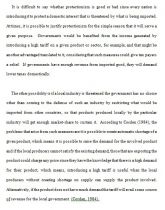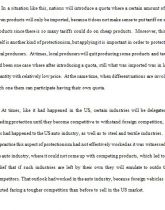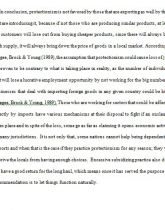Hľadaj
Zobraz:
Univerzity
Kategórie
Rozšírené vyhľadávanie
45 144
projektov
Home » Semestrálna práca » The Disadvantages of Protectionism affect All Exporting Nations Similarly
The Disadvantages of Protectionism affect All Exporting Nations Similarly
| Prípona .doc |
Typ semestrálna práca |
Stiahnuté 0 x |
| Veľkosť 0,1 MB |
Jazyk anglický |
ID projektu 9435 |
| Posledná úprava 07.08.2018 |
Zobrazené 3 163 x |
Autor: - |
 Zdieľaj na Facebooku
Zdieľaj na Facebooku |
||
| Detaily projektu | ||
- cena:
30 Kreditov - kvalita:
88,6% -
Stiahni
- Pridaj na porovnanie
- Univerzita:Vysoká škola manažmentu v Trenčíne
- Fakulta:-
- Kategória:Ekonomika » Ekonómia
- Predmet:Business economy
- Študijný program:-
- Ročník:3. ročník
- Formát:MS Office Word (.doc)
- Rozsah A4:11 strán
It is difficult to say whether protectionism is good or bad since every nation is introducing it to protect a domestic interest that is threatened by what is being imported. At times, it is possible to justify protectionism for the simple reason that it will serve a given purpose. Governments would be benefited from the income generated by introducing a high tariff on a given product or sector, for example, and that might be another advantaged translated to it, considering that such measures could give tax payers a relief. If governments have enough revenue from imported good, they will demand lower taxes domestically.
Kľúčové slová:
protectionism
business economy
tariff
tax payer
supply
demand
revenue
quota
indystry
China
labour
Zdroje:
- Corden, W. M. (1984). The Revival of Protectionism. Occasional Paper 14. New York and London: Group of Thirty.
- Ebeling, R. M. (1991). Free Trade versus Protectionism. Freedom Daily. Retrieved May 30, 2006 from http://www.fff.org/freedom/0191b.asp
- Krueger, A. O. (1997). Free Trade Agreements Versus Customs Unions. Journal of Development Economics, Vol. 54. (No. 1) pp.169-187.
- Magee, S. P., Brock, W. A., & Young, L. (1989). Black Hole Tariffs and Endogenous Protection. Cambridge: Cambridge University Press.
- Yoffie, D. B. (1983). Power and Protectionism: Strategies of the Newly Industrializing Countries. New York: Columbia University Press.







